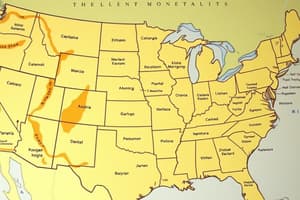Podcast
Questions and Answers
What was the belief in Manifest Destiny?
What was the belief in Manifest Destiny?
- Slavery should be abolished in all states.
- The U.S. should remain isolated from other nations.
- The U.S. should focus on strengthening its military.
- The U.S. had the right to expand from coast to coast. (correct)
What initiated the Aroostook War?
What initiated the Aroostook War?
Disputed territorial boundaries between Maine lumberjacks and British Canada.
When did Texas join the United States?
When did Texas join the United States?
1845
What agreement divided the Oregon territory between the U.S. and Britain?
What agreement divided the Oregon territory between the U.S. and Britain?
The Mexican War lasted from ______ to ______.
The Mexican War lasted from ______ to ______.
What treaty ended the Mexican War?
What treaty ended the Mexican War?
What did the Wilmot Proviso propose?
What did the Wilmot Proviso propose?
What does popular sovereignty refer to?
What does popular sovereignty refer to?
What was the purpose of the Gadsden Purchase?
What was the purpose of the Gadsden Purchase?
What significant issue arose from the Mexican Cession?
What significant issue arose from the Mexican Cession?
What was the goal of the Free Soil Party?
What was the goal of the Free Soil Party?
What did the Fugitive Slave Law provide for?
What did the Fugitive Slave Law provide for?
Who was Harriet Tubman?
Who was Harriet Tubman?
Which of the following was part of the Compromise of 1850?
Which of the following was part of the Compromise of 1850?
What did the Kansas-Nebraska Act achieve?
What did the Kansas-Nebraska Act achieve?
What was the Republican Party's main focus when formed in 1854?
What was the Republican Party's main focus when formed in 1854?
What was the outcome of the Dred Scott Decision?
What was the outcome of the Dred Scott Decision?
Who wrote Uncle Tom's Cabin?
Who wrote Uncle Tom's Cabin?
What happened during the Pottawatomie Creek Massacre?
What happened during the Pottawatomie Creek Massacre?
What was the stance of the American Party (Know Nothing Party) towards immigration?
What was the stance of the American Party (Know Nothing Party) towards immigration?
Flashcards are hidden until you start studying
Study Notes
Manifest Destiny
- Belief in the 1840s that the U.S. was destined to expand from coast to coast.
- Fueled by concepts of white racial superiority and American cultural exceptionalism.
Aroostook War
- Occurred in 1839 over disputed territory between Maine lumberjacks and British Canada.
- Resolved with the signing of the Webster-Ashburton Treaty.
Annexation of Texas
- Texas joined the U.S. in 1845 after gaining independence from Mexico.
- This act angered Mexico and contributed to the outbreak of the Mexican War.
Acquisition of Oregon
- In 1846, the U.S. and Britain agreed to divide Oregon at the 49° N latitude.
Mexican War
- Fought from 1846 to 1848, initiated when Mexican troops crossed into Texas.
- Ended with the Treaty of Guadalupe Hidalgo, granting the U.S. Texas, New Mexico, and California for $15 million.
Treaty of Guadalupe-Hidalgo
- Treaty concluding the Mexican War; formalized land acquisition by the U.S. from Mexico.
Wilmot Proviso
- Proposed in 1846 to ban slavery in territories acquired from Mexico; passed in the House but defeated in the Senate.
Popular Sovereignty
- Concept that residents of a territory should decide on the legality of slavery; significant in the Compromise of 1850 and the Kansas-Nebraska Act.
Gadsden Purchase
- Acquired in 1853, this land purchase included southern Arizona and New Mexico to facilitate a transcontinental railroad.
Mexican Cession
- Region ceded by Mexico in 1848 under the Treaty of Guadalupe Hidalgo; raised the contentious issue of slavery's expansion into new territories.
Free Soil Party
- Formed in 1847-48, aimed at preventing slavery in new territories such as Oregon and the Mexican Cession.
Fugitive Slave Law
- Part of the Compromise of 1850, this law mandated the return of escaped slaves, intensifying Northern opposition and resistance efforts.
Underground Railroad
- Network operational from circa 1830 to 1860, helped enslaved African Americans escape to freedom, prominently associated with figures like Harriet Tubman.
Compromise of 1850
- Included California's admission as a free state, popular sovereignty for Utah and New Mexico, abolition of the slave trade in D.C., and a stricter fugitive slave law.
Kansas-Nebraska Act
- Enacted in 1854, it established Kansas and Nebraska with the principle of popular sovereignty; significantly increased tensions leading to the Civil War.
Republican Party
- Formed in 1854 from the amalgamation of anti-slavery Whigs, Democrats, and Free Soilers; the first sectional political party focused on preventing slavery's spread.
The Caning of Charles Sumner
- In 1856, Senator Sumner was attacked by Preston Brooks in the Senate after denouncing pro-slavery actions, highlighting the intense sectional conflict.
Dred Scott Decision
- In 1857, the Supreme Court ruled Dred Scott could not sue for freedom, classifying him as property; this provoked outrage in the North and satisfaction in the South.
Uncle Tom's Cabin
- Published in 1852 by Harriet Beecher Stowe, this influential antislavery novel stirred Northern anti-slavery sentiments and heightened Southern resentment.
Pottawatomie Creek Massacre
- In 1856, John Brown and followers killed five pro-slavery settlers in response to violence in Lawrence, Kansas, contributing to the "Bleeding Kansas" conflict.
American Party (Know Nothing Party)
- Active in the 1850s, it opposed immigration, particularly from Germans and Irish, reflecting nativist sentiments during this period.
Studying That Suits You
Use AI to generate personalized quizzes and flashcards to suit your learning preferences.




